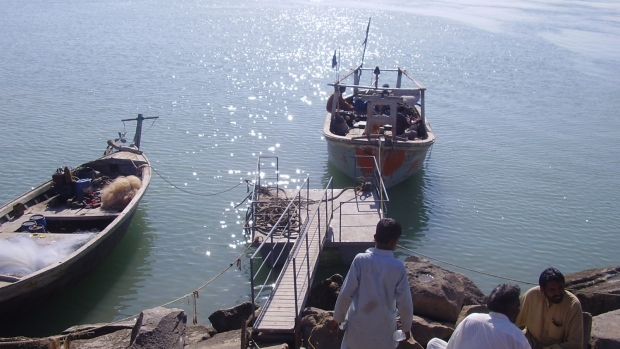Grants :: Small Grant Facilities :: Eco-Tourism as an Alternative Means of Livelihood
Eco-Tourism as an Alternative Means of Livelihood

Ecotourism As Alternate Livelihood Means, Miani Hor © MFF/SDO
Objectives
- To stop the unsustainable harvesting of natural resources, such as fisheries and mangroves by local fishermen.
- To enable twenty small boat owners to generate and diversify their income from eco-tourism.
Background
Miani Hor is a lagoon situated 90 km west of Karachi, on the Balochistan coast and is drained primarily by the Windor and the Porali, both of which are non-perennial rivers. Notably, it is the only place in Pakistan where three species of mangrove, namely Avicennia marina, Rhizophora mucronata and Ceriops tagal grow naturally. It is also an important habitat for migratory birds. Ninety percent of the inhabitants of the three villages along the coastline of Miani Hor depend mainly on fishing and fishing-related activities for their income, although fishing is only done for eight months in a year and must be discontinued during the monsoon season (from May to August). The local women are also engaged in the collection of fuel wood and fodder for livestock. This unsustainable harvesting of the lagoon’s natural resources is a major source of concern.
The project’s aim is to reduce pressure on the lagoon’s natural resources (fisheries and mangroves) by providing local fishing communities with alternative opportunities for income generation. To this end, eco-tourism will be developed and promoted in the area, which will involve the locals by training some of them as tour guides and encouraging others to allow their boats to be hired for boat rides. In order to give the local women an equally important role in this initiative, they will be encouraged to provide local traditional food to the visitors while 15 of them will be trained in embroidery and will have their products sold at an outlet at the CIC (the Conservation Information Centre set up by the SDO in Sonmiani). This will ensure continuity of the project goals after the project duration has run its course and hence continued benefit for the locals.
Target beneficiaries
The project will benefit local fishing communities, and subsequent tourists who will visit the area.
Outputs
- Development of infrastructure for ecotourism by constructing one small jetty and providing safety equipment for tourists (such as life jackets) at the CIC.
- Promoting ecotourism in the area through capacity building of local fisherfolks, linkages and information dissemination.
Accomplishments and challenges
- 20 small boat owners trained as “eco-tourist” guides;
- A small floating jetty constructed to support mangrove-based ecotourism.
- Local community boats equipped with safety gadgets.
- Fifteen local women were trained in embroidery skills so that they could sell their products. The women are also engaged in cooking traditional food for the visiting tourists; these activities have encouraged the role of women in household income generation.
- A brochure on ecotourism published.
Contributions to cross-cutting themes
Communications
Awareness of eco-tourism will be raised through a website, signboards, brochures and a visit from one Karachi-based journalist organisation.
Gender Equality
Developing the skills of local women; provision of traditional food and sale of embroidery products means women will have a more important part in generating household income.
Climate Change
Preventing the unsustainable harvesting of mangroves for fuel wood and fodder will reduce the impact of climate change and protect the coastline against natural disasters.
Lessons Learned
- Ecotourism has great potential in Miani Hor area to generate livelihood opportunities for local fisherfolks; however the adaptability of this idea would be gradual and will require constant efforts by local CBOs.
- The capacities of fishermen and CBO members in mangrove based ecotourism have been strengthened to sustain the idea beyond the project life. However, the deterioration in law and order situation may deter the tourists visiting the area.
- Sociocultural restrictions limit male interaction with females and engagement of women in productive activities.
Project Facts
Country
Location
Miani Hor , Baluchistan Province
Topic
- Sustainable Livelihoods
- Community Resilence
- Sustainable Business Practices
- Climate change
- Gender equality
- Capacity development
- Knowledge management and communications
Duration
5th Jul 2013 to 5th Jul 2014
MFF Grant Amount
PKR 999,500
Implementing Partner
Sonmiani Development Organisation (SDO)
E-mail: sdosonmiani@yahoo.com
